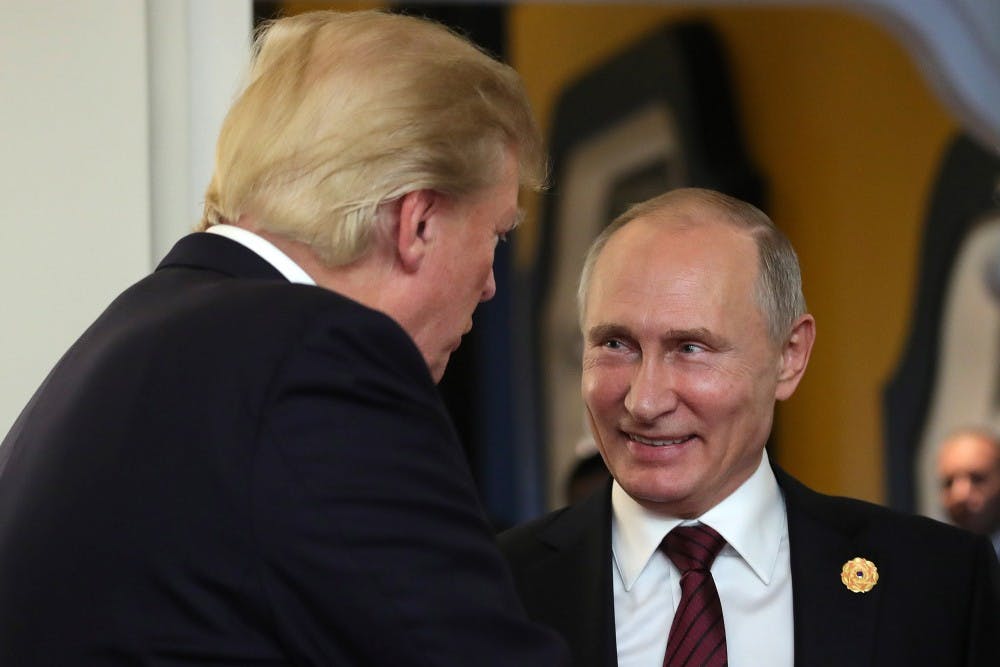North Carolina voters think the investigation into President Donald Trump’s administration’s potential Russian connections is a “serious matter,” and will likely reveal more criminal activity, according to the Elon University Poll results released Nov. 14.
Tuesday’s poll included the responses of 771 registered North Carolina voters. Respondents were questioned about their opinions on Gov. Roy Cooper’s job performance, Trump’s job performance and nuclear attacks in addition to the Russian Investigation.
Some North Carolinians — 39 percent of those polled — said they believe the investigation is little more than “just politics,” but their voices were drowned out by the 52 percent who said the investigation should be taken seriously.
Approval ratings
In spite of this, Trump’s approval rating in North Carolina increased slightly since the last Elon Poll in October. Last month, 34 percent of respondents approved of Trump’s performance in comparison to 37 percent most recently.
Almost 60 percent of millennials were likely to disapprove of the job the president is doing and members of the silent generation — individuals above the age of 73 — were most likely to approve of his performance.
But Richard Burr and Thom Tillis — both Republicans senators for North Carolina — were criticized by respondents for their involvements with the president, and less than a third of respondents approved of their respective performances as a result.
Almost half — 46 percent — of respondents said Burr and Tillis should be less supportive of the president, while 38.5 percent said they should support the president more.
Cooper is enjoying much more positive feedback, with 49 percent of respondents approving of his performance. This corresponds to the Democrats’ recent nationwide success during the early November elections last week. His popularity is almost unchanged since the April Elon Poll when his approval rating sat at 48 percent.
Looking toward next year’s election, Jason Husser, assistant professor of political science and policy studies and director of the Elon Poll, said he expected the Russian investigation to result in a higher percentage of Republicans saying they were motivated to vote next year. Contrarily, just 18 percent said they felt more motivated.
“That shows that there’s some backlash going on against Republicans, but I thought that would be about the same as what Democrats are facing,” Husser said. “Democrats were 53 percent more voted.
“Now, it’s a long way to 2018 … this doesn’t show Democrats are going to sweep the midterm elections. But this does show, as of now, Democratic enthusiasm because of the Russian investigation is greater than Republican backlash against it, at least in term of turnout motivations,” Husser said.
Media bias
Since October, North Carolina voter opinions have not changed significantly regarding media bias in regard to coverage of Trump.
A narrow majority — 51.6 percent — of North Carolinians said they think the media is biased against Trump while just 43.7 percent said the media is not biased.
According to Tuesday’s poll, Republicans are overwhelming more likely to perceive a media bias at 90 percent, but almost a quarter, or 23 percent, of Democrats also said they believe Trump contends against media bias.
North Korea
Over the past fews months, speculations increased about the threat of nuclear war in light of ongoing tensions between the United States and North Korea.
In North Carolina, the Elon Poll concluded that one in four registered voters believe nuclear weapons could be used at some point in the next 12 months.
Husser said he expected this result to be closer to 10 percent.
“It is higher than I expected — 24 percent,” Husser said. “While it is far from a majority, given the extreme sort of catastrophic nature of one of these exchanges, it suggests that policymakers should know that voters are concerned about nuclear weapons.”
Husser said this correlated highly with party identification — 41 percent of Democrats said they thought nuclear weapons might be launched by the United States or North Korea in the next 12 months in comparison to 11 percent of Republicans.
The Poll found that women are more likely than men and blacks are more likely than whites to believe that nuclear weapons are an imminent threat. Those who disapproved of Trump’s job performance are more than twice as likely to think nuclear weapons could be used, at 31 percent, than those who said they approve of Trump’s performance, which only made up 14 percent.


